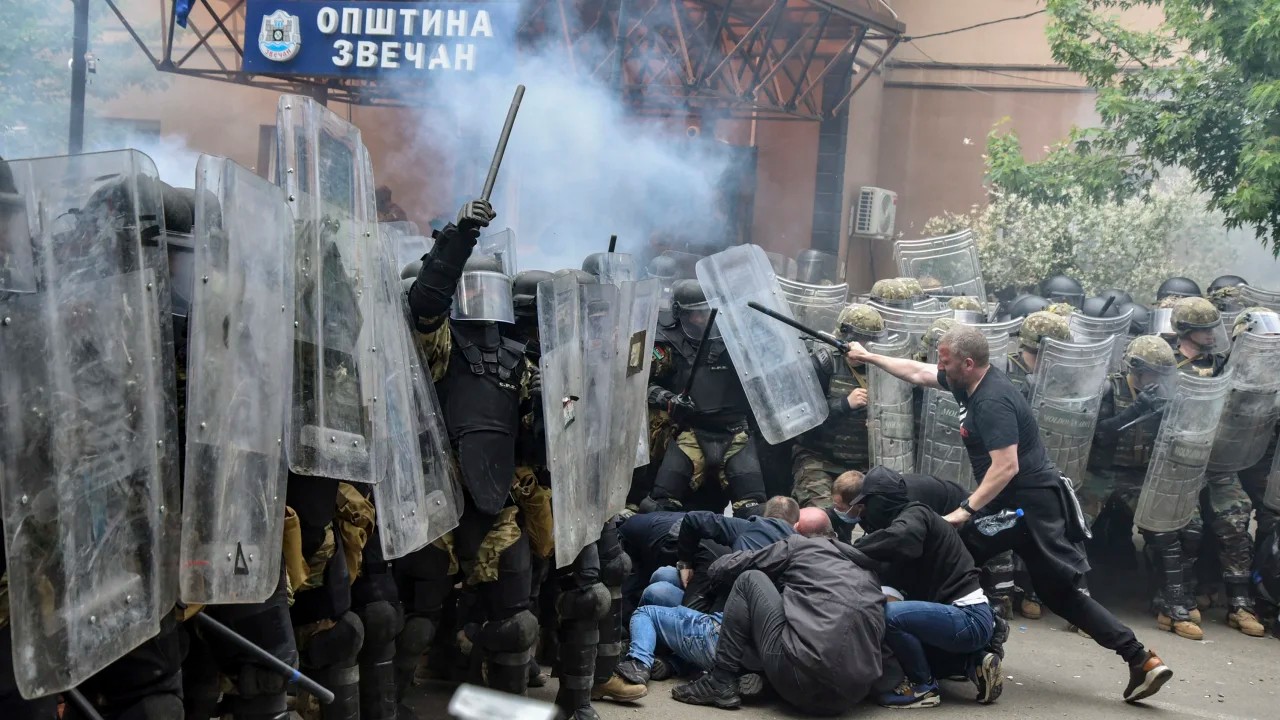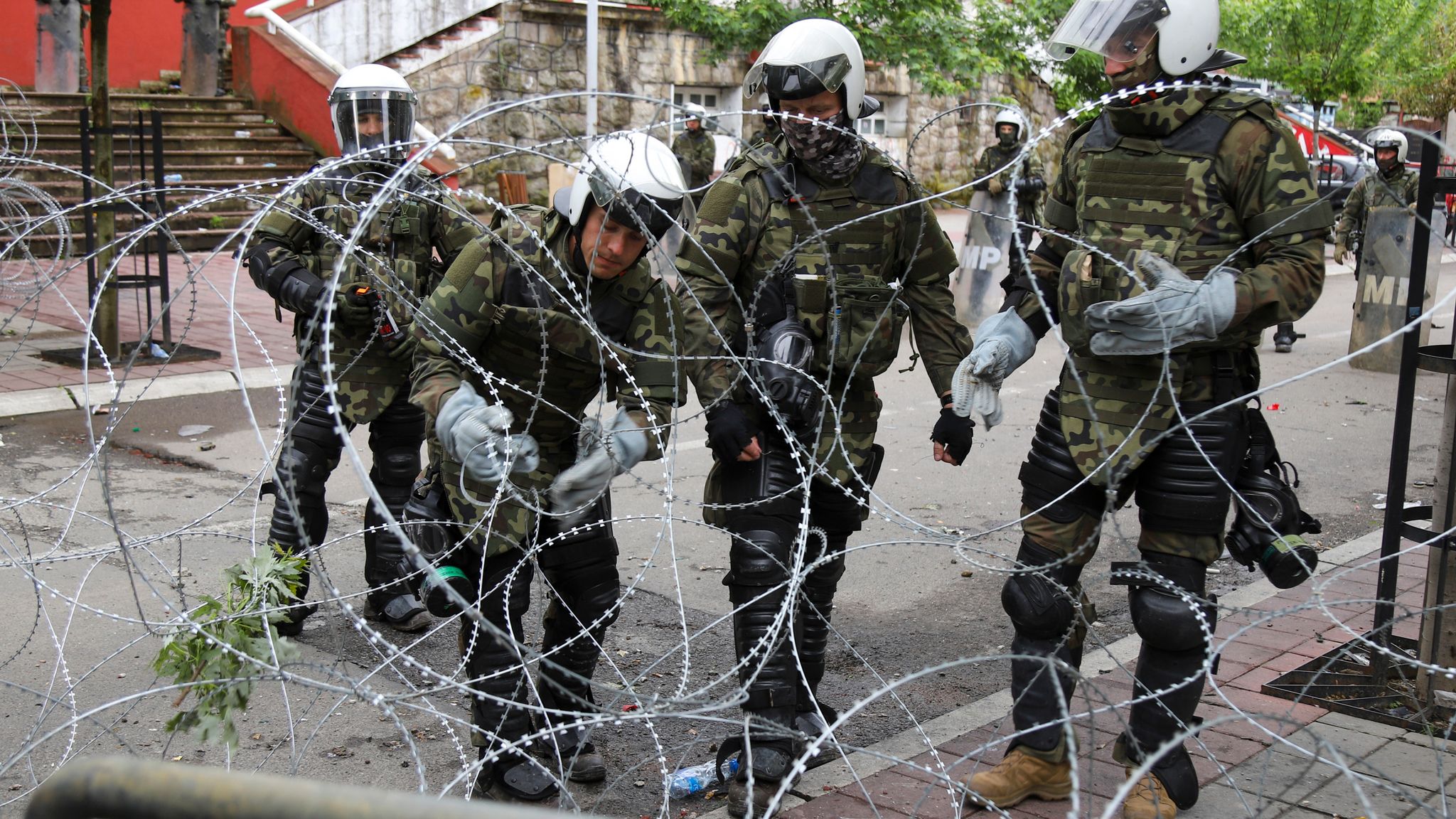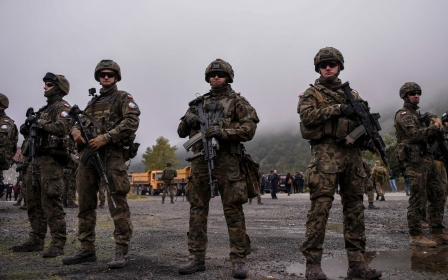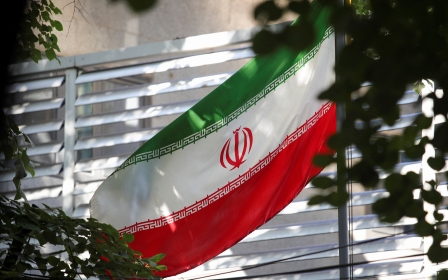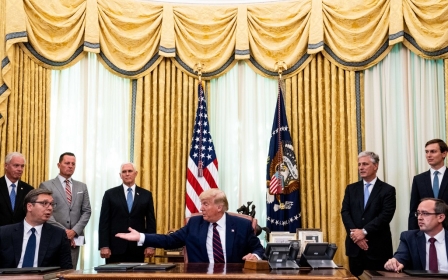Kosovo-Serbia: Can Turkey mediate where the West has failed?
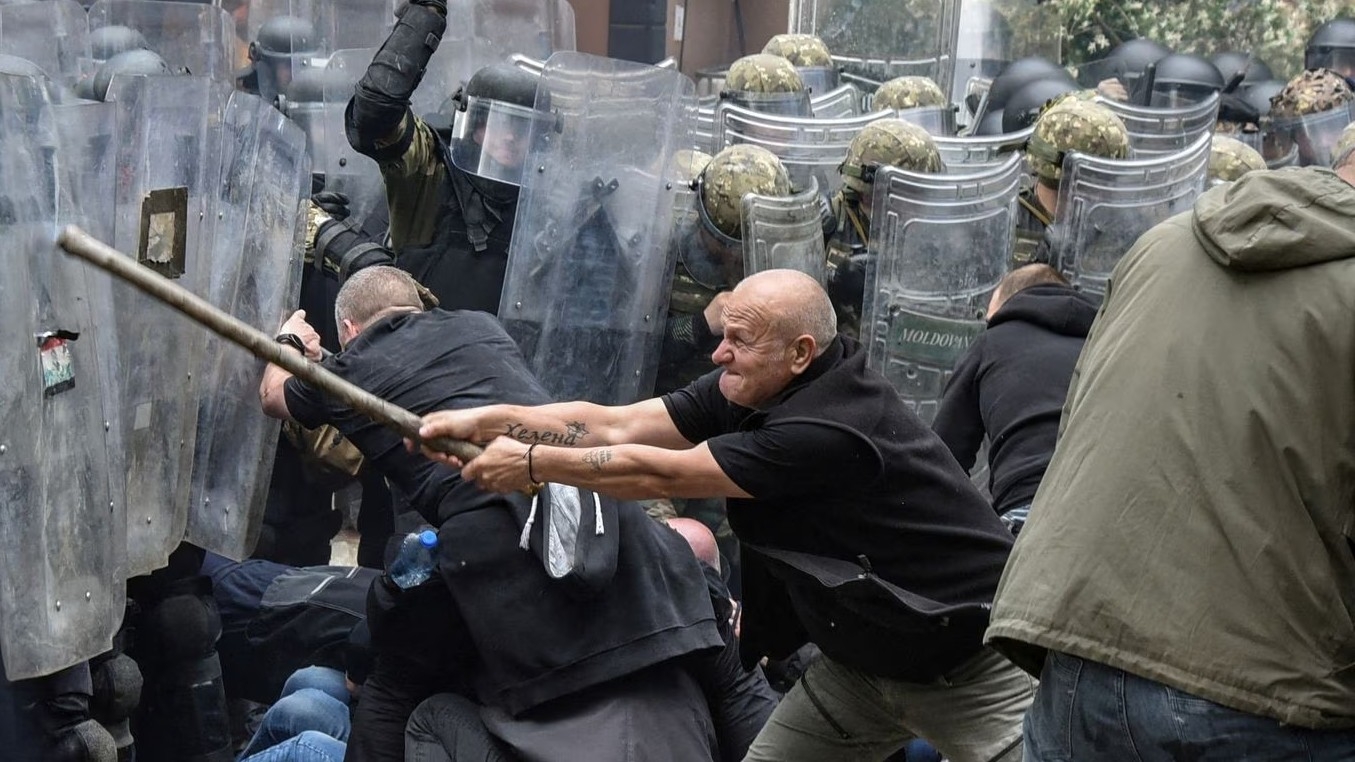
An organised assault by Serbian state-backed militants on public buildings in the north of Kosovo over the weekend resulted in police and Nato soldiers clashing with men clad in masks and wielding metal pipes.
Nato condemned the attack, which left at least 30 soldiers wounded, as "totally unacceptable".
The current crisis dates back to April, when Kosovo Serbs boycotted local elections. As a result of the low turnout, ethnic Albanians took control of the local councils, which were predominantly Serb.
When the elected Albanian representatives sought to enter the public buildings they were assaulted by Belgrade-backed militants sporting the “Z” insignia, Russia’s symbol of war in Ukraine.
In a move that has been described as “strategic incoherence” by the UK foreign affairs select committee chair Alicia Kearns, the US has now proceeded to sanction the Kosovan government in Pristina for not running its decision-making process through Washington first.
“The US is obviously turning against [Kosovo’s Prime Minister] Albin Kurti in part because he's trying to assert the kind of sovereignty that they never had in mind for Kosovo,” said a Kosovo-based academic who wished to remain anonymous in order to speak freely.
The US has largely avoided criticising Serbia following the violence, in a bid to keep the close Russian ally from slipping further into Moscow’s embrace.
But an increasingly independent-minded Kosovo, willing to pursue its own national interests, has become difficult for Washington to accept after Pristina chose to allow the democratically elected mayors to take their posts.
'European powers and the US really thought that they would keep Kosovo in this suspended, deferred state of sovereignty'
- Kosovan academic
“Essentially the US wants Kurti out, just like they wanted him out in 2020. But no one here supports that,” said the academic, speaking to Middle East Eye from Pristina.
In March 2020, Kurti faced a US-orchestrated “political coup” after the Kosovan prime minister refused to follow the political whims of the then US president. The US special envoy for Serbia and Kosovo, Richard Grenell, was reported to have put immense pressure on Kurti's junior coalition partner, the right-wing Democratic League of Kosovo, which withdrew its support for the government.
Such was the public outrage in Kosovo at US interference that a year later, when elections were held in March 2021, Kurti's party, the Self-Determination Movement (LVV), won by an unprecedented landslide, with more than 50 percent of the vote - a damning rebuke to US meddling.
Kurti, then as now, stood up to Washington, which in recent years has sought to force Kosovo to sign up to policies that many in the country don’t believe are in their national interests. Worse still, in private, some politicians in Kosovo regard US policies as weakening Pristina's sovereignty.
“Kurti is trying to preserve the sovereignty of Kosovo. Whereas the European powers and the US really thought that they would keep - and they're trying to keep - Kosovo in this suspended, deferred state of sovereignty where we always need their assistance or we're made to believe that we need their assistance,” said the academic.
"And obviously, the current tensions are not disconnected from the larger geopolitical power play between the West and Russia."
Losing legitimacy
Kosovo declared independence in 2008, following a war in 1998-99 in which the Kosovo Liberation Army (KLA), assisted by Nato, drove back Serbian forces who had embarked on a systematic campaign of ethnic cleansing.
Almost 10,500 ethnic Albanians were killed or disappeared, up to 20,000 women were raped and more than 800,000 were forcibly expelled from their homes.
Following the war, Kosovo has been one of the most staunch, if not overzealous, supporters of the West and the US in particular.
Roads have been named after US presidents, and children after Bill Clinton and former British Prime Minister Tony Blair. Pristina even has a pantsuit shop dedicated to the fashion choices of the former United States Secretary of State Hillary Clinton.
The political elite in the Muslim-majority country have long believed the west could steer Kosovo on the difficult journey of institutionalising its statehood.
Increasingly, however, the public mood in the country no longer accepts that the West is an innocuous player.
“Recently, the people of Kosovo feel that the US and the EU will stop at nothing to extricate Serbia from the Russian sphere of influence,” said a political activist close to Kurti's LVV party.
“Western powers seem willing to sacrifice Kosovo, one of the most pro-Western countries in the world, in favour of winning over Serbia, a decidedly pro-Russian nation,” added the activist, speaking to MEE anonymously.
US actions appear increasingly to validate that perception.
Following the attack by Serb militants on Kosovo and Nato security forces, the US ambassador to Kosovo, Jeff Hovenier, reserved his ire for Kosovo.
“I would be surprised if any Kosovar government official would be able to visit the US at this time,” said Hovenier.
Over the years, Kosovo has aligned itself with every major US foreign policy goal. It agreed to establish an embassy in Jerusalem, one of only three countries to do so, and designated the Lebanese Hezbollah group as a “terrorist organisation". Kosovo imposed sanctions on Russia, following its war in Ukraine, and hosted Afghan refugees awaiting screening for asylum in the US. Meanwhile, Serbia avoided imposing punitive measures against Moscow.
“Instead of bolstering Kosovo's position, these actions appear to have weakened it. The US simply takes Kosovo for granted,” said the LVV activist.
Kosovo is now increasingly looking for “alternative partners who would treat them with dignity. Turkey is well placed for this,” the activist added.
“If the current trajectory of western policy continues, and if Turkish diplomacy becomes more active in the Balkans, the quest to cast a wider net is poised to intensify in Kosovo.”
Can Turkey make a comeback?
The Balkan file represents a bipartisan affair in Turkey. Turkish government officials who spoke to MEE are increasingly focused on what Ankara can do to help resolve tensions in the region.
An opposition member of parliament, from the centre-left Republican People’s Party (CHP), said, on condition of anonymity, that he was keen on Ankara taking a more proactive mediating role.
Meanwhile, Talha Kose, an international relations professor at Ibn Haldun University in Istanbul, told MEE: “We have strong economic and political ties with Serbia. We also have strong grassroots cultural, historical and political ties with Kosovo.”
Turkey, said Kose, is in a special position to mediate given that it has “warm, sincere and balanced ties” with both sides.
'Neither Brussels nor the US seem to aim at a lasting, real status quo-building process. They tend to consider the region as a chessboard, just as Russia does'
- Sinan Baykent, foreign policy expert
“The EU is struggling to play a more constructive role with Serbia and Kosovo. This represents a diplomatic opportunity for Turkey,” he added.
The diplomatic breakthrough on grain shipments that Turkey brokered last year between Russia and Ukraine is a useful template that Ankara could utilise in principle, said Kose.
“One mistake that the EU constantly makes is that they take positions in the domestic politics of these countries,” he said, adding that there is also undoubtedly a “Russian role in the ongoing tensions".
Serbian President Aleksandar Vucic has already called on his Turkish counterpart, Recep Tayyip Erdogan, to help mediate tensions.
“The US, Nato and EU are in one place. Russia, China are in another place, and they have contradicting positions and interests. Turkey could help convene a summit with all these stakeholders,” said Kose.
Given the conflict in Ukraine it might be “impossible right now”, but “Turkey should build contacts with these stakeholders”.
Sinan Baykent, a foreign policy expert in the Balkans, believes that the US is increasingly “focused on quick solutions in the Balkans” as it seeks to move its focus to China.
The Kosovo file represent a legacy “burden” that the US wants to remove from its agenda. It is in a “hurry” to leave the region, said Baykent, speaking to MEE from Istanbul.
Turkey’s presence, on the other hand, is “deep rooted and historical”, said Baykent, and unlike the US it is not interested in “building a temporary status quo destined to fail eventually.
“Neither Brussels nor the US seem to aim at a lasting deal. They tend to consider the region as a chessboard, just as Russia does,” he said. “Do they really care about the wellbeing of the Balkan peoples? I highly doubt it.”
While the EU and the US have “contributed to the recent escalation”, Turkey has achieved an equilibrium between all the regional stakeholders, said Baykent, and a summit could bring together Albania, Kosovo and Serbia.
The US and the EU in particular would likely not welcome a greater Turkish role in the Balkans.
For its part the EU considers the region as its “backyard”. Baykent believes that this, however, should not dissuade Turkey from filling a regional void to mediate between all sides.
“I believe Ankara has the capabilities to monitor such a process without interfering in domestic politics and decisions of the involved parties," he added.
"Not making pressure, not threatening, not blackmailing, but coordinating, understanding and cooperating. These actions could open a new perspective in the region."
This article is available in French on Middle East Eye French edition.
Middle East Eye propose une couverture et une analyse indépendantes et incomparables du Moyen-Orient, de l’Afrique du Nord et d’autres régions du monde. Pour en savoir plus sur la reprise de ce contenu et les frais qui s’appliquent, veuillez remplir ce formulaire [en anglais]. Pour en savoir plus sur MEE, cliquez ici [en anglais].


